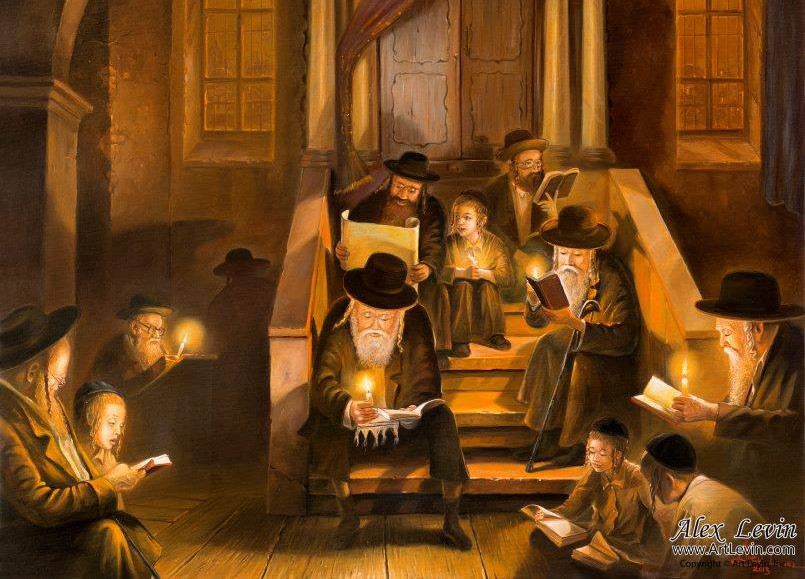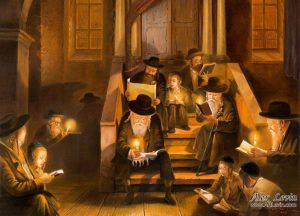We begin this Shabbis Nachamu Anniversary Edition with a mazel tov close to home. A big mazel tov to Zack Perl upon his upcoming wedding this coming Sunday, to Sarah Mandelbaum. Who is Zack Perl you may ask? Zack is the brother of Ariella Grossman (nee Perl) who is married to the Oisvorfer’s son Zachary. He is the son of our machatunim, Karen and Allen Perl, they of Teaneck, New Jersey, and is the grandson of Margot Silverman who -bli ayin horo- has passed her 90th birthday, and will be flying to Los Angeles this week to attend her grandson’s wedding. May she be blessed with continued good health.
And who is Sarah Mandelbaum? Sarah is the beautiful and accomplished daughter of Rachel and Marvin Mandelbaum, they of Hancock Park. Rachel is originally from the Five Towns (daughter of Miriam and Joseph Lifschutz), and Marvin a friend for over forty years. The future Oisvorfer spent many a night and weekend at the Mandelbaum home in Hancock Park back in the late 1970s where he was hosted by Marvin’s parents, Viola, may she live and be well, and Paul Mandelbaum, OBM. In fact, the Oisvorfer slept in Marvin’s bed while Marvin was dorming in Yeshiva Torah V’das but hanging around the Grossman family residence with his friend Avi Grossman. Mazel tov to the Perls, the Mandelbaums, all 3 grandmothers, and to both extended families. Mazel tov as well to Mark Mandelbaum , Marvin’s older brother and his eishes chayil Shaindy whose engagement took place while Mark was staying with the Grossmans. May Sarah, whom we have known since she was still in her carriage, and Zack, be blessed to merit many decades of blissful marriage.
Raboyseyettes and Ladies
Did Moishe Ever Step Foot Into the Promised Land?
Nu, the three weeks, the nine days and even Tisha Be’ov are finally behind us and not a minute too soon. Are they? Not really! Early yesterday morning, on the 10th of Av, The Oisvorfer woke up, took his early morning shower and was about to don clean gotchkis (underwear). Ober there was no clean underwear to be found: all the gotchkis had already been worn and were waiting to be washed. Why wasn’t the laundry done late Tuesday evening? Why was the Oisvorfer faced with but two choices, none too pleasant? Should he simply remove a pair for the laundry and re-use; who would know? Or, should he go commando? Earlier this week, the Oisvorfer was discussing this very shaylo with a female shiksa friend who suggested that the first choice -the reusing- could be accomplished by simply turning the gotchkis inside out for one day.
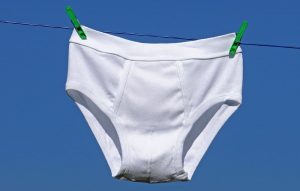 Nu, those who went to yeshiva, and or, learned the Mishneh Birura which contains a detailed list of all restrictions of the Three Weeks, Nine Days and Tisha Be’ov, would know that according to many, though Tisha Be’ov is over, as should be any restrictions which began with the Three Weeks, still, we are not permitted to do laundry until chatzois (sometime after 1PM this year). Until then, the Oisvorfer would need to endure. Of course there are exceptions to this rule but they don’t apply this year. And did you know that according to some decent sources (many, if not most), Tisha Be’ov, and its host of restrictions, were not really over at 8:45, 8:49, 8:58 PM or whatever z’man your local rabbi adheres to? Mistama not. Though our beautiful tradition provides a number of minor and major fast days, each with its own particular restrictions, none carry over for a second day. None, that is, but Tisha Be’ov and events we recall on this day, seem maybe not to have started on the 9th, and certainly don’t end with nightfall on the 9th. Is the 9th a fake date? Nu, soon we’ll answer that. It’s seemingly mamish osur (forbidden) to eat meat, do laundry, drink wine, listen to music, make and attend weddings, cut hair, shave and enjoy some intimacy with the eishes chayil, until after chatzois the following day. Nu, what’s another few hours after waiting so many weeks and months, if you chap? What’s pshat here? Is Tisha Be’ov a two day event? Was the fast over or not? We’ll answer that as well very shortly ober ershtens (firstly)….
Nu, those who went to yeshiva, and or, learned the Mishneh Birura which contains a detailed list of all restrictions of the Three Weeks, Nine Days and Tisha Be’ov, would know that according to many, though Tisha Be’ov is over, as should be any restrictions which began with the Three Weeks, still, we are not permitted to do laundry until chatzois (sometime after 1PM this year). Until then, the Oisvorfer would need to endure. Of course there are exceptions to this rule but they don’t apply this year. And did you know that according to some decent sources (many, if not most), Tisha Be’ov, and its host of restrictions, were not really over at 8:45, 8:49, 8:58 PM or whatever z’man your local rabbi adheres to? Mistama not. Though our beautiful tradition provides a number of minor and major fast days, each with its own particular restrictions, none carry over for a second day. None, that is, but Tisha Be’ov and events we recall on this day, seem maybe not to have started on the 9th, and certainly don’t end with nightfall on the 9th. Is the 9th a fake date? Nu, soon we’ll answer that. It’s seemingly mamish osur (forbidden) to eat meat, do laundry, drink wine, listen to music, make and attend weddings, cut hair, shave and enjoy some intimacy with the eishes chayil, until after chatzois the following day. Nu, what’s another few hours after waiting so many weeks and months, if you chap? What’s pshat here? Is Tisha Be’ov a two day event? Was the fast over or not? We’ll answer that as well very shortly ober ershtens (firstly)….
Welcome to parshas Voeschanan and Shabbis Nachamu, they always coincide. The emes is that the beginning of Voeschanan is quite depressing in that we find Moishe, the greatest manhig (leader) the Yiddin ever had, the man who assisted the RBSO in leading His people out of Mitzrayim (where they slaved for 210 years), the man who led the Yiddin during their entire 40 year escapade through the midbar, the same man that endured uprisings, revolts and yet begged the RBSO to forgive and forget the innumerable acts of bad behavior including avoido-zoro, sexual escapades and more, recounts how he himself begged the RBSO as many as 515 times to forget and forgive Moishe’s sole act of shtekin-abuse for which the RBSO cancelled his passport and condemned him to die. One very long sentence. He would not enter the Promised Land. Is there no statute of limitations when it comes to shtekin abuse? Oy vey!
Was Moishe asking for a new car? A replacement shtekin? Another eishes chayil (wife), efsher a white one this time? No! All he wanted was to step foot into the land, and didn’t he taka deserve that? Ober, not just did the RBSO say no, but listen to this: Said the RBSO: the answer is still no, and stop asking me; case closed! Moreover, says the heylige Toirah, the RBSO teased Moishe and told him to climb the mountain and gaze his eyes in all four directions to see the land that he wasn’t going to enter. Is that nice? What a reward for his dedication, gevald! What chance do we have of being heard?
Ober, is it emes that he did not enter the Promised Land? Was he, when he ascended the mountain, already standing on at least part of the Promised Land? Perhaps! He was? Ober, doesn’t the first word of this week’s parsha of Voeschanan mean that Moishe beseeched the RBSO to let him enter the Promised Land. What’s pshat that efsher he was mamish already in? Nu, let’s find out; was he, or wasn’t he in?
For the record, as Moishe began the first of his three orations last week (and continuing into this week) the Yiddin were no longer in the desert. Instead they were, as the heylige Toirah told us (Devorim 1:5) in the Plains of Moiov. They were standing on land captured during war. What became of this land? Nu, let’s recall that just last week we learned that Moishe gave this land over to the 2 (and 1/2) shevotim who asked for their portion, not inside the Promised Land, but in the land immediately outside. Ober, if this land was taka occupied by the Yiddin, the shevotim of Reuvain, Gud (and 1/2 of Menashe), was it not by extension, a rather large slice of the inheritance? If this captured land was included in the general lottery which Moishe allotted to the 12 shevotim (excepting Levi), it epes appears to the Oisvorfer that this land too was considered a part of the Land the RBSO promised to Avrohom way back in Bereishis. And taka, let’s look at the words of the promise made to Avrohom (Bereishis15:19-21). Says the heylige Toirah, azoy:
| 19. The Kenites, the Kenizzites, and the Kadmonites, | יטאֶת־הַקֵּינִי֙ וְאֶת־הַקְּנִזִּ֔י וְאֵ֖ת הַקַּדְמֹנִֽי: | |
| 20. And the Hittites and the Perizzites and the Rephaim, | כוְאֶת־הַֽחִתִּ֥י וְאֶת־הַפְּרִזִּ֖י וְאֶת־הָֽרְפָאִֽים: | |
| 21. And the Amorites and the Canaanites and the Girgashites and the Jebusites.” | כאוְאֶת־הָֽאֱמֹרִי֙ וְאֶת־הַכְּנַֽעֲנִ֔י וְאֶת־הַגִּרְגָּשִׁ֖י וְאֶת־הַיְבוּסִֽי: |
 Were he and the Yiddin then not camped out in the plains of Moiav, in land they had captured? They were! Was the land they were now standing on a part of the Promised Land? Did Reuvain and Gud get any other land? Not! Efsher we can kler that while Moishe did not make it over the river and into any part of the land occupied by the seven inhabitant nations, he did enter occupied land which was seemingly part of the RBSO’s promise to Avrohom. That promise included land occupied by ten nations. Moishe got to step foot into some of the Promised Land. The bottom line may be azoy: Entry into certain areas requires specific permission; at times, we may only look but not enter, if you chap.
Were he and the Yiddin then not camped out in the plains of Moiav, in land they had captured? They were! Was the land they were now standing on a part of the Promised Land? Did Reuvain and Gud get any other land? Not! Efsher we can kler that while Moishe did not make it over the river and into any part of the land occupied by the seven inhabitant nations, he did enter occupied land which was seemingly part of the RBSO’s promise to Avrohom. That promise included land occupied by ten nations. Moishe got to step foot into some of the Promised Land. The bottom line may be azoy: Entry into certain areas requires specific permission; at times, we may only look but not enter, if you chap.
With but seven weeks to go before Rosh Hashono, followed by the aseres yimay tshuva and Yom Kippur, it’s just about time to start thinking about your own shtekin and where it’s been this past year and years. Ober with Shabbis Nachamu mamish here, zicher one of the most popular shabosim on the entire Jewish calendar, let’s be happy. Seemingly this shabbis was chosen by someone as the happy shabbis and the Oisvorfer reminds you that we have previously covered the salient parts of the parsha in the last seven years. And, as you peruse this week’s shout-out out to Sarah and Zack and to their respective families, the Oisvorfer too marks a new beginning, if you chap, as we begin year eight of weekly parsha reviews. Parsha pearls can be found at www.oisvorfer.com – check them out.
Ober let’s not get too depressed over Moishe’s inability to convince the RBSO to forgive his one sin. The good news is that you are not Moishe. Giferliche oisvorfs like yourselves will of course be held accountable ober luckily -so it seems- not at the very high standards Moishe set for himself. The RBSO knows just who you are, what you do and how you think. He understands that many of you are mamish no good. Ober the good news is that you don’t disappoint and therefore have a chance, with repentance, to efsher change His mind and be forgiven. He expects little. Ober let’s not focus on tshuva talk this week. Instead, let’s enjoy Shabbis Nachamu wherever you find yourselves.
Shoin! Two days ago, as our stomachs were growling for some food or at least a drink of water, we were taka, as we should have been, thinking about the loss of the Beis Hamikdash (Temple) -both of them- and lamenting their loss. Today, our moods are much better and everyone has but one thing left on his/her mind: where are we going for Shabbis Nachamu? Did the Novee (Prophet) suggest we need to or must go away? Why it is so important go somewhere, anywhere, for Shabbis Nachamu, ver veyst? Who started this so-called must get-away, ver veyst? Where is it written that Shabbis Nachamu cannot be marked at home in the comfort of one’s home with multiple bedrooms and bathrooms? Nowhere! And why would people want to pack up their entire family and drive hours in heavy traffic to stuff themselves into one room and at times also share a bathroom, ver veyst? Ober azoy iziz! That’s how it is. Shabbis Nachamu, more than any other time on our calendar is a must go! Shoin and go we do.
Did the Novee Yishayohu (Isaiah), when uttering the words of “nachamu, nachamu ami…”, ever imagine that thousands of years later, few would associate Shabbis Nachamu with consolation and hope, ober hundreds of thousands – efsher millions- would associate this special shabbis with weekend get-a-ways, parties, BBQs, singles events, chapping a good piece of fleish (meat) if you chap, a trip to the Hamptons, bungalows and in era now also sadly gone, to one of the myriad kosher hotels that used to dot the landscape of the Catskill mountains? Mistama not!
Is today’s generation really mourning the loss of the 1st and 2nd beis hamikdash, both of which, according to our tradition, were lost on Tisha Be’ov? Or, are we efsher really mourning the loss of a bygone era when Tisha Be’ov meant that Shabbis Nachamu, marked with great joy at the Pioneer, the Pine View, Grossinger’s, the Homowack, and even Howard Johnson’s just outside Grossinger’s and myriad others, was just around the corner?
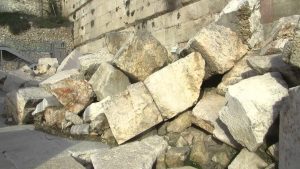 Mistama there taka was a time when Shabbis Nachamu was marked and had real meaning and purpose. Mistama that time was thousands of years back and coincided nebech with the loss of the 2nd beis hamikdash which fell to the Romans. Why it fell is of course the subject of many heylige Gemoras and medroshim, each of whom, have their own spin. Many blame it on sinas-chinom (gratuitous hatred)and even some loshoin horo, the usual suspects. Is that emes? So many Yiddin died at the hands of the Romans and the Beis Hamikdash was destroyed only because Yiddin couldn’t get along? Yikes! How will it ever be rebuilt? Will there ever come a time when Yiddin will all get along? Do all sources agree that the Temples were destroyed due to excessive sinas-chinom? Of course not!
Mistama there taka was a time when Shabbis Nachamu was marked and had real meaning and purpose. Mistama that time was thousands of years back and coincided nebech with the loss of the 2nd beis hamikdash which fell to the Romans. Why it fell is of course the subject of many heylige Gemoras and medroshim, each of whom, have their own spin. Many blame it on sinas-chinom (gratuitous hatred)and even some loshoin horo, the usual suspects. Is that emes? So many Yiddin died at the hands of the Romans and the Beis Hamikdash was destroyed only because Yiddin couldn’t get along? Yikes! How will it ever be rebuilt? Will there ever come a time when Yiddin will all get along? Do all sources agree that the Temples were destroyed due to excessive sinas-chinom? Of course not!
Was sinas chinom the sole reason for its destruction or was it but the last straw that sealed its fate? Ver veyst? Says Toisfis azoy: the first Beis was destroyed because of the idol worship, prohibited sexual relations and bloodshed that took place within it. Zicher not any of its intended uses; oy vey! And the second? “Because they love money and each one hates his neighbor.” Shoin as you can only imagine, the heylige Gemora goes on to list at least several other reasons that caused its destruction including this myseh (story): pay attention.
Says the heylige Gemora (Gittin 58a- where else) azoy: It happened that a man cast his eyes on the wife of his carpentry teacher. Once his teacher required a loan. He said to [his teacher]: “Place your wife in my keep and I will lend [money] to you.” [The teacher] placed his wife in his keep, and she stayed with him three days. [The teacher] came to him and asked, “Where is my wife that I sent to you? ” He replied: “I released her immediately, but I heard that some young people took advantage of her on the road.” [The teacher] asked him: “What shall I do?” He said: “If you heed me, you should divorce her.” [The teacher] said: “But her ketubah is excessive.” He replied: “I will lend you [the amount] and you will give her the ketubah.” [The teacher] divorced her and [the student] married her. When the time [for the loan] came due and he did not have enough to repay it, [the student] said: “Come and work off your debt in my service.” So they [the student and the wife] would be sitting, eating and drinking, and [the teacher] would be standing and serving them their drinks, and his tears would fall from his eyes into their cups. It was at that moment that the [Divine] decree was sealed.
Was that the last straw? Could one fellow’s desire to use his wood skills, if you chap, have brought down the holy Temple? Ver veyst!? In any event, they are both gone and Tisha Be’ov is meant as a day for us to lament the losses and recall that it was taka our bad behavior, in some form, that caused both temples to be doomed. Ober do we?
It appears that bazman hazeh (in our times),it’s more of a nechtiger-tug (fugetabouitt). In hyntige tzytin (in our times), Shabbis Nachamu, which incidentally marks the first of seven shabosim between now and Rosh Hashono, is the first shabbis we’re allowed to enjoy ourselves since the onset of the three weeks and especially the nine days culminating with Tisha Be’ov. Of course we can never be too happy, we are, after all, still in golus (diaspora). Nachamu is party time, hotel time, and travel time. Where we go isn’t important but it’s epes seemingly important that we go. Why? Ver veyst? And the question is azoy: is going away for Shabbis Nachamu a minhag, a mesora (tradition), or efsher maybe even a din? If one doesn’t go away, is he being oiver (violating) a di’oyrayso (biblical commandment) and therefore subject to all sorts of divine punishment? Or, is it strictly a family and sholom bayis matter between man and his eishes chayil? Ver veyst but whatever it is, it has many adherents.
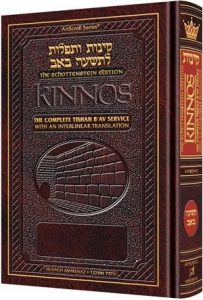 On Tisha Beov morning, with Kinos in hand, the Oisvorfer had the following thought: why are we reading these difficult paragraphs? What do these words mean? Who understands them and does anyone in today’s generation even have a clue as to what took place on Tisha Be’ov? What about the days before and after? Something happened before and after? Moreover, what the hec is an elegy? Nu, it’s never too late to learn a new word and the word of the day is taka elegy which in literature refers to a mournful, melancholic or plaintive poem, especially a funeral song or a lament for the dead. Hence, some call these lamentations. Veyter.
On Tisha Beov morning, with Kinos in hand, the Oisvorfer had the following thought: why are we reading these difficult paragraphs? What do these words mean? Who understands them and does anyone in today’s generation even have a clue as to what took place on Tisha Be’ov? What about the days before and after? Something happened before and after? Moreover, what the hec is an elegy? Nu, it’s never too late to learn a new word and the word of the day is taka elegy which in literature refers to a mournful, melancholic or plaintive poem, especially a funeral song or a lament for the dead. Hence, some call these lamentations. Veyter.
To chap what happened, lommer chazerin the heylige Gemora (Taanis 29a) which tells us azoy: On the 7thof Av, the goyim (gentiles) entered the Beis Hamikdash where they spent three days feasting and contaminating it. As the sun was setting on the 9th of Av, they set the Beis Hamikdash ablaze, and it continued to burn for the entire next day.
Oib azoy (if so), efsher you’re klerring azoy: why was the 9th selected as the day of mourning and recalling. Why not the 7th, the 8th or even the 10th? And guess what? You’re not the first to raise this question and no lesser an authority than the Shulchan Aruch (Code of Jewish Law) notes that taka the Beis Hamikdash burned the entire day of the 10th of Av. On the 10th? OMG! Seemingly, the fire was finally extinguished as the sun set on the 10th of Av.
Does everyone agree? Of course not! And taka there is much discussion as to exactly when the two Temples were destroyed. According to one account (Melachim II 25:8,9) it was destroyed on the 7th of Av, while according to another (Yirmiyahu 52:10) it was destroyed on the 10th of Av. Which was it? Ver veyst? What to do? The heylige Gemora came up with a compromise: In order to reconcile this contradiction, the Gemora (Tannis 29a) tells us azoy: on the 7th of Av the Babylonians entered the Beis Hamikdash and went on a rampage which continued for three days. On the afternoon of the 9th they set fire to the Beis Hamikdash which culminated in its destruction.
Does everyone agree on a date certain as to when the second Beis Hamikdash was destroyed? Also not! Says the heylige Gemora: on the 9th of Av. Ober said Josephus (War of the Jews 6:4:5): it was destroyed on the 10th. And taka based on this and other considerations, a number of past sages advocated moving the fast from the 9th to the 10th. Though all agree that the fires were set on the 9th, it was late in the afternoon. Most of the destruction seemingly took place on the 10th of Av. Unlike loshoin horo, the fire didn’t spread as quickly.
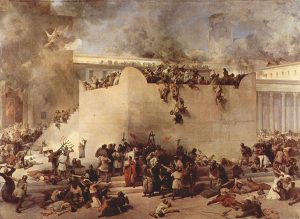 Zugt de heylige Gemora veter (the Gemora continues) azoy: Rebbe Yoichonon remarked that given the fact that the Beis Hamikdash was set afire late afternoon on the 9th and continued burning through the 10th, had he been alive during this period and of course survived, he would have selected the 10th rather than the 9th of Av for the commemoration of the destruction. After all, the burning of the Temple only began on the 9th; the bulk of its destruction occurred on the 10th.
Zugt de heylige Gemora veter (the Gemora continues) azoy: Rebbe Yoichonon remarked that given the fact that the Beis Hamikdash was set afire late afternoon on the 9th and continued burning through the 10th, had he been alive during this period and of course survived, he would have selected the 10th rather than the 9th of Av for the commemoration of the destruction. After all, the burning of the Temple only began on the 9th; the bulk of its destruction occurred on the 10th.
Ober why on the 10th? Because he felt that the main mourning should take place on the day that the Beis Hamikdash was actually destroyed rather than on the day that the tragedy began. And given this information, why do we taka mark this solemn day on the 9th and not the 10th? Taka an excellent kasha: simply stated; we don’t hold like Rebbe Yoichonon! Fartig (case closed). Nice opinion, few takers. Instead we observe on the 9th, when the destruction began. Is that so? Not exactly! Though we don’t hold like Rebbe Yoichonon, seemingly many decided not to ignore his opinion totally and today, in our times, there is taka a minhag (custom) to also observe the 10th as a day of mourning. We do? Not exactly! Many observe some restrictions for part of the 10th day. Let’s chazir. Some observe on the 10th and of those, some observe only on part of the 10th. Clear? Veyter, though some women observe the entire month, others, since their wedding anniversary.
Ober if it taka burned all day of the 10th, why don’t we taka fast on that date? Moreover, efsher we should fast and observe on both the 9th and the 10th? Aren’t there other observances of sad events, death lemoshol, which go on for 7 and 30 days? Ober says the heylige Gemora mamish so gishmak azoy: our chachomim (Sages) selected the 9th because “the beginning of the calamity is more significant.”Shoin! Moreover, our wise sages (Chazal) did not institute two consecutive days of fasting because it’s seemingly dangerous for most people to go 48 hours without eating. And taka for most Yiddin, who are accustomed, especially during shabbis and Yom tov getaways, to eating every 30-45 minutes, fasting a 2nd consecutive day, would mamish be disastrous.
As stated above, observant Yiddin have been selected and chosen to observe several fast days including the big one Yom Kippur but not one of them goes on for a second day. Is there any other holiday or even fast day that’s over but not? Ver veyst? Exactly how the heylige Gemora knew that it all came to an end at approximately 12:30PM on the 10th of Av, ver veyst. With such precision timing one might think they would also have known exactly when Rosh Choidesh begins and could have spared us a second day of Yom Tov here in Golus. Shoin, that topic for another day.
Ober the news isn’t all bad. Seemingly, there were some, besides the good wives, that observed some of the mourning restrictions for the entire month of Av. Really? And taka said Rav Pupa: the ban on not scheduling a court appearance with a non-Jew applies for the entire month of Av. Rav Yehuda was of the opinion that the prohibition against doing laundry and taking a haircut continues for the entire month of Av, as well. And no lesser an authority than Rashi, suggested that we are to observe all of the restrictions of the Nine Days until Shabbis Nachamu. Of course, he backed down after the Hotel operators threatened to print future editions of the Chumish with Rashi redacted. In any event, luckily, these opinions did not take hold— yet!
A gittin Shabbis Nachamu-
The Heylige Oisvorfer Ruv
Yitz Grossman
